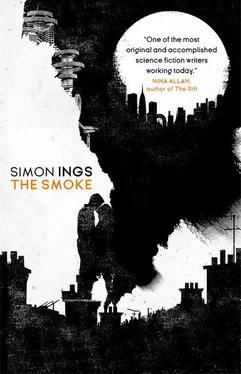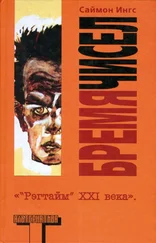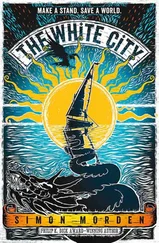I tested the brushes I had bought against my palm. Jim watched me, suspicious. ‘If it tickles, I’m not doing it.’
‘All right.’
‘I don’t know, Stu. Aren’t all those colours going to mark me out?’
‘Desaturated blues and black? This lot will camouflage you, if anything.’
‘What colour are you going to paint my face?’
‘I’m not going to paint your face.’
‘I’m not having that flesh-pink stuff. I’ll look like a Band-Aid.’
Downstairs, we heard movement. Other tenants, maybe, or the landlady herself. We sat in silence, waiting for the coast to clear.
‘This is odd,’ Jim murmured. I glanced over and saw he had worked his way through the book to the bookmark – Betty’s appointment slip from the Gurwitsch Hospital. He had it spread out over the start of Book Six. I came over.
Easy is the descent to Avernus:
Night and day the door of gloomy Dis stands open.
But to recall one’s steps, and pass out into the upper air,
That is the labour, that is the difficulty!
‘Look at the date.’ Kneeling on the paper, Jim reached and tapped its top right-hand corner.
‘What?’
‘Mum was already reborn by then, wasn’t she?’
I looked at the date. ‘So?’
‘So she wasn’t attending appointments at the Gurwitsch. She was well past all that.’
I made a face. ‘Maybe.’
Jim was adamant. ‘“Maybe” nothing.’ He stepped studiously over the paper, examining it. ‘Her name’s nowhere on it.’
‘There’s no name on it.’
‘Isn’t that odd?’
‘I don’t know.’
Jim stepped off the book onto the cushion and let it take his weight as he rolled backwards, head over heels, and onto his feet. At his size, it wasn’t a particularly athletic gesture at all – just his natural way of moving. I thought of Mars and how Jim might once have gambolled there. I thought of the meal we had all eaten in the basement kitchen of Stella’s house in Islington, and how Georgy had barracked Jim that night. He had been in a mood to make digs at everyone that night; even his own daughter. Even Fel.
Even Fel.
And then I knew. The truth came clear. It screamed at me, as surely as Fel had screamed at me on our last night.
There is no fucking time!
I remembered waking suddenly in the middle of the night. But the bedroom was not dark, there was a light on, and I turned over in the bed, and there was Fel, sitting up on pillows, the reading lamp on, poring over an old book. And when she saw that I was awake and felt me move against her, she grinned, the jewel shining in her tooth, and lifted the book for me to see – Betty’s Aeneid – and said, ‘The old stories are the best.’
And then she closed the book. The placemarker wasn’t Betty’s at all. It was Fel’s.
The appointment had been Fel’s, too.
I looked at my watch. I pulled my coat from its hook on the door. I checked I had my wallet. I snatched Jim up from the floor and crammed him protesting into my pocket. I hunted for my keys when all the time they were hanging from the keyhole in the door. I snatched them, left the room and locked the door behind me. My landlady looked out of the kitchen as I passed. I shouted some incoherent explanation as I barrelled past and toppled into the street.
I had ten minutes before the last London train.
‘Eat your greens!’ exhorts Hattie Jacques, from the poster on the tea-house wall. She has company now. Dirk Bogarde in Space Force blue: ‘Together, We Can Build Tomorrow!’ Underneath, a third poster. No photograph this time. Cheaply and hurriedly produced, with a War Ministry stamp. Absorbent paper: the ink’s already begun to run from four block-printed words: TAKE BACK THE MOON.
Poster by poster, broadcast by broadcast, the world is rumbling towards another war. In the West Riding, the collapse of the old dispensation is expressed mostly through official directives. Posters on the tea-house wall. New projects announced, new targets set. Fatter pay packets and less time in which to drink them away.
In the Smoke, it’s far more complicated. On the Thames, the ferries run empty that once carried unaccommodated guest workers to and from their menial jobs on Threadneedle Street and Bishopsgate. Someone built their own howitzer, if ‘ you can believe this, and shot out one of the Bund’s bright civic ‘moons’, plunging late-returning workers into darkness: they had to navigate by the light from their own phones. And yet, as you come off the sleeper bleary-eyed – it’s not much past six in the morning – you are confronted by protestors defending the Bund. They’ve gathered keen and early for the beginning of rush hour. They’re a well-dressed lot: students. If all goes smoothly they can be in lectures by ten, nursing secret smiles and bruised knuckles and no professor the wiser. They’re wielding banners sporting the entwined snakes of the Gurwitsch Hospital letterhead. They’re fans of the Bund, cheerleaders of the posthuman future. Mortality’s no friend of theirs; who wouldn’t want to live for ever? The police are trying to corral the protestors out of the way of the escalators. You shimmy past, absurdly self-conscious, as if you might be recognised. As if your ambiguous and intagliated relationship with the Bund was something special, something unprecedented. Nonsense.
Down the escalator, the posters are stuck over with political symbols, the times and dates of marches and flags of several sorts, from the Union Jack to the Palestine tricolour; half-torn away, most of them, or obliterated with an angry pen. There are soldiers wearing the portcullis badge of the London Regiment waiting on the platform with you. You wonder whether they are peacekeeping now, in this city that is psychically coming apart. You wonder what the Bundists make of them.
The train arrives. The carriages aren’t full, you board easily enough, and there’s a seat for you. Someone has left their newspaper behind. You pick it up and refold it, beginning at the beginning. It’s yesterday’s late edition, and in the ticket office of the Underground you’ve already seen headlines that attempt to answer the bald question posed by the headline on the front page before you: WHAT’S WRONG WITH THE MOON?
Below the headline, a photograph of the full Moon is surrounded here and there (the areas helpfully circled by the paper’s picture desk) by patches of blotchy light: a sort of ham-fisted corona.
Opposite you, a boy of about twelve leans in behind his mother’s open paper. She’s reading today’s edition: on its front page, the picture is the same, or similar – the corona has become, or been made, more visible. The image has been moved to the top of the page and below it, the headline has been reduced to a single word: ATTACK.
Lost in the mystery and threat of that headline, you have lost your sense of time. Aware that the train is not moving, you experience a lurching moment of panic. After all this while, have you somehow missed your stop? No: the indicator at the end of the carriage still says Covent Garden. The train is being held in the tunnel. There are no announcements, yet nobody around you looks particularly put out. The carriage seats are all taken now and three people are standing by the doors through which you boarded.
The first is a young student, possibly a schoolgirl, wearing her backpack modishly low on her back; the second is an Indian businessman; the third an exhausted-looking young white man, his head shaved as though in preparation for a procedure. He’s wearing plaster-spattered jeans and jumper, and he’s holding on to a pole by the door, straddling a bag of tools. Perhaps you should offer your seat to this man: he looks so tired! He has rolled his sleeves up past his elbows and his arms – tanned, downed with blond hairs – tremble as if he has been lifting heavy burdens, or pulling himself repeatedly onto a ledge.
Читать дальше












